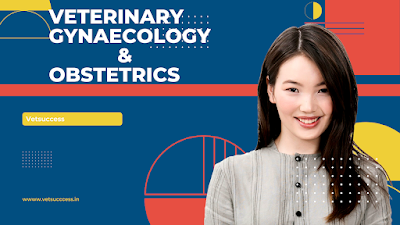Veterinary Gynaecology and obstetrics-andrology-question bank-6
VETERINARY GYNAECOLOGY, OBSTETRICS AND ANDROLOGY
6) The first piglet born from embryo transfer by?
9) World’s second cloned buffalo calf through the advanced hand-guided cloning technique born at NDRI Karnal?
a) Wilmut et al., 1996 b) Brackett et al., 1982 c) Madan et al., 1992 d) none of the above
12) First step in ETT is?
a) Estrus synchronization b) super ovulation c) synchronization of donor and recipient d) none of the above
13) Quality of donor animal for ETT should be ?
a) Superior genetic makeup b) regular estrous cycle c) free from any infection d) all of the above
14) PGF2alpha is luteolytic in cow, buffalo, ewe and does?
a) 6-17 days b) 6 days c) 12-13 days d) none of the above
15) PGF2alpha is luteolytic in pig?
a) 6-17 days b) 6 days c) 12-13 days d) none of the above
16) Interval between two shot prostaglandin protocols for estrus synchronization is ?
a) 10 days apart b) 11 days apart c) 15 days apart d) 9 days apart
17) GPG Protocol is?
a) Ovsynch protocol b) GnRH at day0 + PGF2a at day 7 + GnRH at day 9 + TAI
c) option a and b is correct d) no such protocol
18) Altrenogest feeding for estrus synchronization is followed in?
a) Horse b) swine c) none d) both
19) Progesterone Releasing Device (PRID) contains?
a) 1.55g of progesterone b) 1.38g of progesterone c) 2g of progesterone d) none of the above
20) Controlled Internal Drug Release (CIDR) contains?
a) 1.55g of progesterone b) 1.38g of progesterone c) 2g of progesterone d) none of the above
21) Non-hormonal method of estrous synchronization is?
a) Male effect b) Artificial lighting c) Weaning d) All of the above
22) Hormone used for treatment in superovulation?
a) FSH b) ecG/PMSG c) all the above is correct d) none of the above
23) The gap between two successive super ovulation?
a) 40 days b) 70 days c) 60 days d) none
24) Dose of FSH in superovulation in cattle is?
a) 28-40 mg b) 10-20 mg c) 50 mg d) none
25) Dose of eCG in superovulation in cattle is?
a) 1100 IU b) 1500-3000 IU c) 1200 IU d) none
26) The optimum time for superovulation treatment is done between ———days of estrous cycle in cattle
a) 8 -12 b) 6-8 c) 3-5 d) none
27) Animal having 3 or more than three ovulation (>3CL) following gonadotrophin treatment considered as superovulatory responded?
a) Cow b) buffalo c) goat d) sheep
28) Higher half life of eCG /PMSG is due to presence of?
a) Carbohydrate b) protein c) Sialic acid d) mineral
29) Disadvantage of eCG over FSH for treatment of super ovulation is ?
a) unovulated follicle b) hyperstimulation of ovary c) poor embryo recovery and quality d) all of the above
30) Signet ring is seen in?
a) Early blastocyst b) late blastocyst c) mid blastocyst d) hatched blastocyst
31) In sheep, goat & swine the embryos are collected by?
a) Flushing b) laparatomy c) all of the above d) none
32) Collection of embryo in cattle can be done on?
a) 7-8th day b) 5-6th day c) 3-4th day d) none
33) Collection of embryo in buffalo can be done on?
a) 7-8th day b) 5-6th day c) 3-4th day d) none
34) Collection of embryo should be done on ……….result high pregnancy rates?
a) 8-cell b) blastocyst stage c) both a and b d) none
35) Embryo which are more tolerate in vitro handling ?
a) older embryo b) younger embryo c) both a and b d) none
36) Embryo are mostly collected from the uterus from?
a) morula to the expanded blastocyst b) hatched blastocyst c) blastocyst d) none
37) Searching or recovery of embryo can be done from donor animal using?
a) Surgical method b) non surgical method c) laparoscopic method d) all of the above
38) Most commonly used flushing medium of embryo is?
a) DPBS b) PBS c) HBSS d) all of the above
39) Surgical collection of embryo is done in?
a) sheep b) goat c) pig d) all of the above
40) Non surgical collection of embryo is done in?
a) cattle b) buffalo c) mare d) all of the above
41) Site of surgical collection of embryo in sheep and goat is ?
a) Oviduct b) uterus c) both a and b d) None of the above
42) pH of the embryo containing media is ?
a) 7 b) 7.2-7.6 c) 6.7 d) 6.7-6.9
43) Osmolarity of the embryo containing media is ?
a) 270-310 mOsM/kg b) 270-310 OsM/kg c) 270-310 kg d) none of the above
44) Percentage of BSA in flushing media is ?
a) 0.1% b) 0.4% c) 0.2% d) none of the above
45) Percentage of FCS in holding media is ?
a) 5-9% b) 4-5% c) 10-20% d) none of the above
46) Pore size of biological filter for media is ?
a) 0.22μ b) 0.11 μ c) 0.4μ d) none of the above
47) Advantages of supplementation of BSA and FCS in media is?
a) decrease surface tension b) reducing the tendency of embryo to float or adhere to plastic or glass c) inactivate heavy metals and toxins d) All of the above
48) Use of PGF2alpha is recommended in embryo collection from donor?
a) to speed recoveries of embryo b) to prevent pregnancy if unleft viable embryo c) both a and b d) none of the above
49) Total volume of PBS needed in flushing of embryo ranges from?
a) 300-800 ml b) 100-200 ml c) 30-60 ml d) None of the above?
50) Advantage of non surgical collection of embryo as compared to surgical method?
a) No anesthesia is required b) no post surgical complication c) no risk of anaesthesia d) all of the above
51) Recovery of embryo is more in?
a) non surgical method b) surgical method c) both a and b d) none of the above
52) Evaluation of embryo can be done using ?
a) Stereo zoom microscope b) simple microscope c) both a and b d) none of the above
53) Diameter of embryo is?
a) 100 µm b) 150-190 µm c) 200 µm d) none of the above
54) Magnification for evaluation of embryo is?
a) 10 X b) 40 X c) 50-100 X d) none of the above
55) Transferable embryo are graded as ?
a) Excellent b) good c) both a and b d) none of the above
56) For optimum results, recipient should be in estrus within……of the donor?
a) 12 hrs b) 24 hrs c) 36 hrs d) none
57) Transmissible of infectious disease is less in?
a) Semen b) embryo c) both a and b d) none
58) Embryo transfer is limited in?
a) Sheep b) horse c) both a and b d) none
59) Storage of embryo can be done ?
a) Refrigerator temperature for 2 days b) liquid nitrogen c) Vitrification d) all of the above
60) Solidification of the liquid by extreme increase in viscosity during ultra-cooling in embryo storage?
a) Cryopreservation b) vitification c) cryo storage d) none
61) Thawing of embryo can be done?
a) 0.25ml straw – 15 sec. in air and 20 sec in water bath at 37 ºC
b) 0.5 ml straw- 20 sec. in air and 20 sec in water bath at 37 ºC
c) both a and b
d) none of the above
62) Cryoprotactants for preservation of embryos?
a) Glycerol b) ethylene glycol c) Dimethyl sulfoxide d) all of the above
63) Advantages of cryopreservation of embryo is?
a) long term storage b) eliminates estrus synchronization in recipients c) worldwide distribution d) all of the above
64) Collection of oocytes can be done by ?
a) dissection b) slicing c) aspiration d) all of the above
65) Collection of oocytes gives the highest number of oocytes?
a) dissection b) slicing c) aspiration d) all of the above
66) The most efficient technique in terms of the time to obtain oocytes?
a) dissection b) slicing c) aspiration d) all of the above
67) Criteria of excellent oocytes is?
a) > 5 layers of cumulus cells b) 3-5 layers of cumulus cells c) 1-5 layers of cumulus cells d) all of the above
68) Commonly used media for invitro maturation of the oocytes is?
a) TCM199 media b) Ham’s F-10 media c) both a and b d) none of the above
69) Culture of the matured oocytes is done at ?
a) 39°C, 5% CO2, 5% O2 and 95% humidity for 24 hrs
b) 35°C, 5% CO2, 10% O2 and 80% humidity for 12 hrs
c) 39°C and 95% humidity for 24 hrs
d) none of the above
70) Commonly used media for invitro capacitation of the oocytes is?
a) TCM199 media b) Ham’s F-10 media c) both a and b d) TALP media
71) Chemical which enhances for invitro capacitation of the oocytes ?
a) Glycosaminoglycans(heparin) b) chondroitin sulphate c) calcium ionophore with or without caffeine d) all of the above
72) Media used for invitro fertilization of the oocytes is?
a) TALP media b) Ham’s F-10 media c) BO media d) both a and c
73) Media used for invitro culture of the oocytes is?
a) TCM199 media b) SOF media c) both a and b d) TALP media
74) IETS stands for?
a) Indian embryo transfer society b) International embryo transfer society c) both a and b d) none of the above
75) Large offspring syndrome is due to?
a) Cloning b) Transgenesis c) IVEP d) all
76) Difference between X and Y bearing sperm ?
a) X sperm is larger than Y sperm b) Y sperm move faster than X sperm c) Y chromosome fluoresces than X sperm d) all of the above
77) In bovines, X spermatozoa bear…………..% DNA than Y bearing spermatozoa ?
a) 3.8 b) 2.8 c) 7.5 d) none of the above
78) First embryo sexing was done by?
a) Wilmut et al., 1996 b) Gardner, 1968 c)Brackett et al., 1982 d) Madan et al., 1992
79) Embryo sexing can be done by?
a) Quantification of X-linked enzyme b) observing barr bodies c) Y specific DNA probe and PCR d) all of the above
80) The process of insertion of new genetic material, frequently recombinant genes into the genome of animals?
a) Cloning b) Transgenesis c) IVEP d) none of the above
81) Transgenic animals can be created by?
a) DNA microinjection b) embryonic stem cell mediated gene transfer c) retrovirus- mediated gene transfer d) all of the above
👉 Question Bank -1
👉 Question Bank -2
👉 Question Bank -3
👉 Question Bank -4
👉 Question Bank -5
👉 Question Bank -6
👉 Question Bank -7
- Please Do Comment if you find any error in the answers✅❌
ANSWERS
1. a 2. a 3. c 4. a 5. b 6. d 7. a 8. a 9. b 10. b
11. a 12. a 13. d 14. a 15. c 16. b 17. c 18. d 19. a 20. b
21. d 22. c 23. c 24. a 25. b 26. a 27. a 28. c 29. d 30. a
31. b 32. a 33. b 34. c 35. a 36. a 37. d 38. a 39. d 40. d
41. c 42. b 43. a 44. b 45. c 46. a 47. d 48. c 49. a 50. d
51. b 52. a 53. b 54.c 55. c 56. a 57. b 58. c 59.d 60. b
61. c 62. d 63. d 64. d 65. b 66. c 67. a 68. c 69. a 70. d
71. d 72. d 73. c 74. b 75. d 76. d 77. a 78. b 79. d 80. b
81. d






